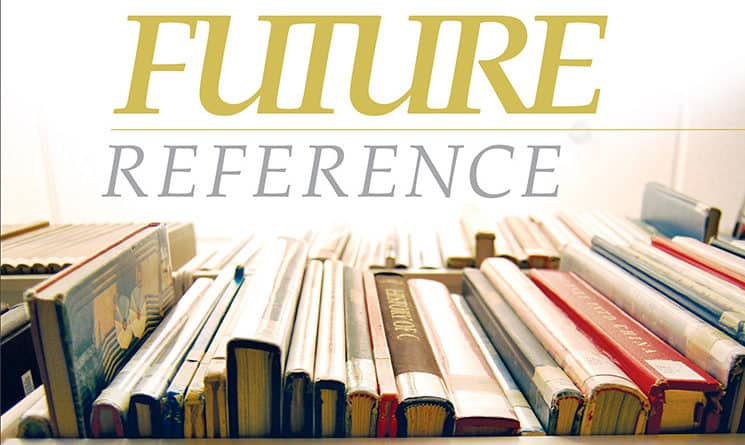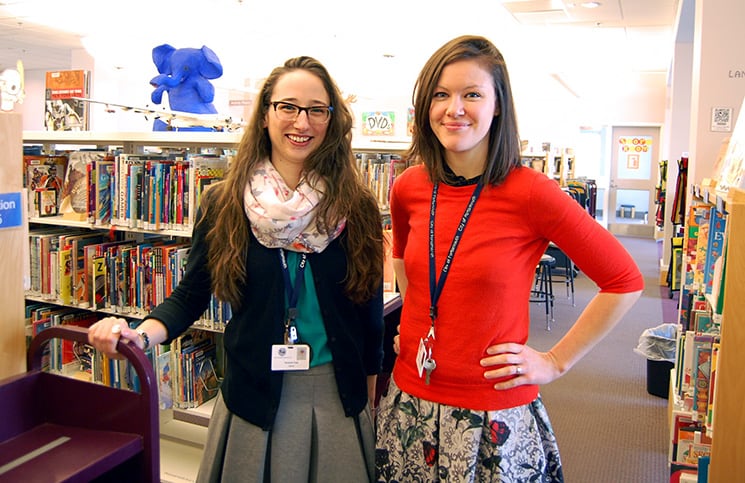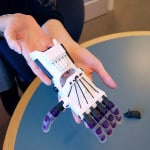It’s a Friday morning at the Portsmouth Public Library and the building is busy with activity. Upstairs, a class on the basics of using Excel is in session; outside the classroom, the chairs and couches and study spaces are filled with library patrons reading newspapers, flipping through magazines, and typing on laptops. Neighbors quietly catch up with each other and parents lead their children around the stacks, while a librarian packages up books that will be donated to Portsmouth Regional Hospital, where they’ll be given to parents of newborns.
Though there’s a lot going on, it’s comparatively quiet. On a given day, the library might be filled with knitting groups, mah-jong games, art lectures, movie screenings, job training programs, and other events.
“The way we look at ourselves is that it used to be we were learning guides, and now we’re life-transformation experts,” said Laura Horwood-Benton, the library’s public programming librarian.
It’s a change that’s happening in libraries throughout the Seacoast and around the country. Though the digital revolution has made e-readers cheap and streaming content plentiful, it’s easy to forget that access nonetheless comes at a price many can’t pay. Now, libraries and librarians find themselves filling that and other gaps, offering a free, public space to learn skills, use technology, and connect with the community.
“The library is really a community space. Somebody said the library is the only space you can be in without having to pay … and that’s something that will always be needed, particularly in tumultuous times,” Horwood-Benton said.
Changing roles
Cathy Beaudoin has worked at the Dover Public Library for 40 years, including as director for the last 16. The first half of her career, she said, was “pretty traditional.”
“And then in the mid-’90s, when we got our first computer … that was the start of the change, and since then, it’s been exponentially increasing, and now we’re in a huge, rapid period of change, which I love,” she said.
The challenge, according to Beaudoin, is balancing the traditional with the new. About half the library’s patrons come in every week for the old-fashioned library experience — browsing the stacks and going home with an armful of books. But the other half come in to use the computers, take out DVDs, and do things that don’t involve books at all.
“Our core mission is still the same: giving everyone in the community equal access to materials and resources. We used to do that through print only … but our role has changed. Instead of telling you where to find this particular book on this shelf, we’re instructing people how to use their iPad or phone to download information from a database.”
Bridging the divide
Dover’s library was built in 1905 and has that old-library feel: high shelves stuffed with books, winding staircases, and long wooden tables. Physically, the library seems like a place immune to change, but that’s not the case, Beaudoin said.
“I see us as being early adapters and teachers more than we used to be,” she said. “Technology is going to continue to change and grow, and we’ve decided to keep growing and changing with it.”
That means offering instructions on how to load books onto e-readers (the weeks after Christmas are particularly busy, Beaudoin said), navigating databases, and even simple things like teaching a patron how to format a resume or attach a document to an email. “We try to help the digital have-nots as well as really techie people,” she said.
That’s also the case in Berwick Public Library in Berwick, Maine. There, director Melissa Saggerer said, the library helps fill in the divide between people who can afford the latest technology and those who can’t. The library does it in large ways — the building’s wireless signal is broadcast into the parking lot so that patrons can have free Internet access, even when the library’s closed — and in small ways. The library offers a selection of movies on VHS, as many patrons still haven’t made the switch to DVD, Saggerer said.
Libraries are also on the frontlines of tackling larger issues, from Internet privacy to free speech. Earlier this year, the Kilton Public Library in West Lebanon received national attention after the library’s board voted to continue hosting a relay for the Tor network, which can make Internet traffic anonymous. The U.S. Department of Homeland Security had previously warned town officials the relay could aid criminals, though advocates said journalists, political activists, and others also use Tor.
Makerspaces and making space
Michaela Pugh has worked at the Portsmouth Public Library for almost a year. She’s finishing her master’s degree in library sciences and works with emerging technologies at the library. One of her areas of expertise is the library’s 3D printer, affectionately named Gutenberg. Pugh offers regular printer demonstrations at the library; one of her first projects was to learn how to print and build a working, plastic, prosthetic hand. It’s an eye-catching way to show the printer’s — and the library’s — capabilities.
“It’s neat technology to see in a library,” Pugh said. “The life-long learning aspect applies to us as well.”
Libraries are increasingly adopting makerspaces — places for patrons to experiment with various technologies or learn how to code. The Portsmouth library is working on opening its own regional Coder Dojo, part of a network of free clubs that teach programming to kids ages 7 to 17. Often on display at the library is an old bicycle that a staff member modified into a pedal-powered charging station.
“It’s all about getting engaged in how things work,” said Sarah Cornell, the library’s supervisor of technical services.
Doing so often means making more space in buildings that are becoming crowded. The Berwick library receives about 12,000 visitors per year, Saggerer said. The library is open 28 hours a week and the staff works part-time.
“We’re often scrambling to meet all the demands,” she said. “We’d like to grow the building physically. We’re outgrowing the space, which is a great problem to have.”
It’s a challenge many Seacoast libraries either have faced or are facing. Portsmouth opened its new library in 2006, and a new library was built in Durham in 2013. The Langdon Library in Newington finished a massive renovation in 2014. Currently, residents in Kittery, Maine, are debating whether to expand the existing Rice Library or construct a new building.
Often, a building’s age can be a problem. While Dover’s 110-year-old library is great for evoking turn-of-the-century charm, it’s not so good for giving patrons or community groups room for collaborative learning spaces.
“We’ve got three meeting rooms and they’re all booked ahead and they’re busy all the time,” Beaudoin said.
New twists



